Welcoming a big puppy into your home is an exciting time, filled with boundless energy and a whole lot of growing up to do. As they transition into their larger adolescent phase, their chewing needs intensify significantly. Finding the Best Chew Toys For Big Puppies becomes a priority not only for their entertainment and dental health but also to protect your furniture and belongings. This guide dives deep into what makes a chew toy ideal for a growing, powerful pup, and highlights some top contenders tested by our expert canine panel.
Big puppies have different needs than their smaller counterparts. Their jaws are stronger, their teeth are sharper, and their teething phase can be particularly intense. Choosing the wrong toy can lead to frustration for both you and your puppy, as toys are destroyed in minutes, potentially becoming a choking hazard. We understand this challenge intimately, having navigated it with our own dogs and assisted countless others at rescue shelters. That’s why we’ve put these toys to the ultimate test, ensuring our recommendations are based on real-world canine approval.
Understanding Your Big Puppy’s Chewing Habits
Before we explore specific toys, it’s crucial to understand why big puppies chew and what characteristics make a chew toy suitable for them. Puppies chew for a variety of reasons:
- Teething: As their adult teeth emerge, chewing helps alleviate discomfort.
- Exploration: Puppies use their mouths to explore their environment.
- Boredom: For energetic puppies, chewing is an outlet for pent-up energy.
- Anxiety: Some puppies may chew when feeling anxious or stressed.
- Instinct: Chewing is a natural instinct for dogs.
For big puppies, these reasons are amplified by their size and strength. Therefore, chew toys need to be:
- Durable: Capable of withstanding strong jaws and persistent chewing.
- Safe: Made from non-toxic materials that won’t splinter or break into small, dangerous pieces.
- Engaging: Offering varied textures and shapes to keep their interest.
- Appropriately Sized: Large enough to not be a choking hazard, but manageable for them to carry and manipulate.
We’ve put several popular “indestructible” toys to the test with our own pack of discerning dogs, ranging from the gentle giants to the powerful chewers. Their honest feedback, often delivered with enthusiastic gnawing and playful pounces, forms the basis of our recommendations.
Top Picks for the Best Chew Toys for Big Puppies
After rigorous testing by our canine experts at Benafim Dog Shelter, here are our top recommendations for the best chew toys for big puppies. These toys were chosen based on their durability, engagement factor, and overall dog approval.
1. Nylabone Extreme Tough Dog Chew Toy
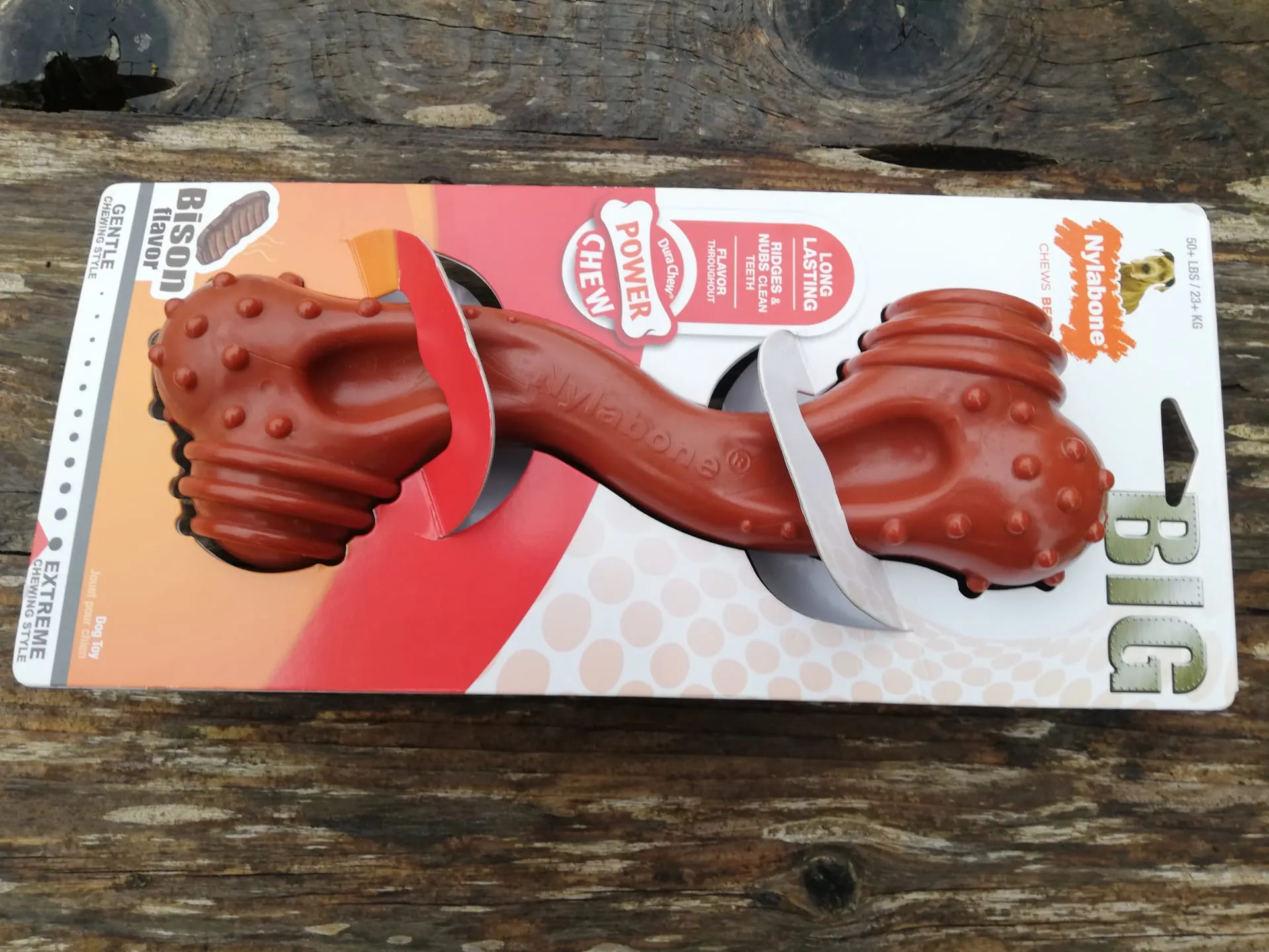
This Bison flavored XXL Extreme Tough Dog Chew Toy is specifically designed for powerful chewers and dogs weighing over 23kg. Nero, our 9-year-old Pitt bull, spent hours chewing on this toy, and it barely showed a mark. Its large size is balanced by its light weight, making it easy for dogs to carry. The slightly curved design provides an excellent grip for their paws, enhancing the chewing experience.
Maya, a rescue who was initially timid, took to this toy immediately. She enjoyed chewing it and running around with it, which also encouraged other dogs like Max to engage in play. The Nylabone is also incredibly easy to clean, and its flavor is long-lasting, eliminating any mess or unpleasant smells. Black Nero, known for his destructive chewing habits, even with strong fencing materials, proved no match for this Nylabone. It held up against his powerful jaws for hours, with minimal tooth marks.
This toy is a fantastic option for owners seeking durable chew toys for large dogs. It’s designed to clean teeth and gums with its raised bristles and is made from safe, non-toxic material.
Details:
- Flavor: Bison (also available in chicken and turkey)
- Measurements: 30.48 x 13.97 x 5.08 cm
- Weight: 485 grams
- Designed for: Dogs over 23 kg
Summary: Every dog at the shelter highly recommends this Nylabone. It’s perfect for dogs who love to chew, get bored easily, and need something both tasty and durable.
2. KONG Rewards Ball
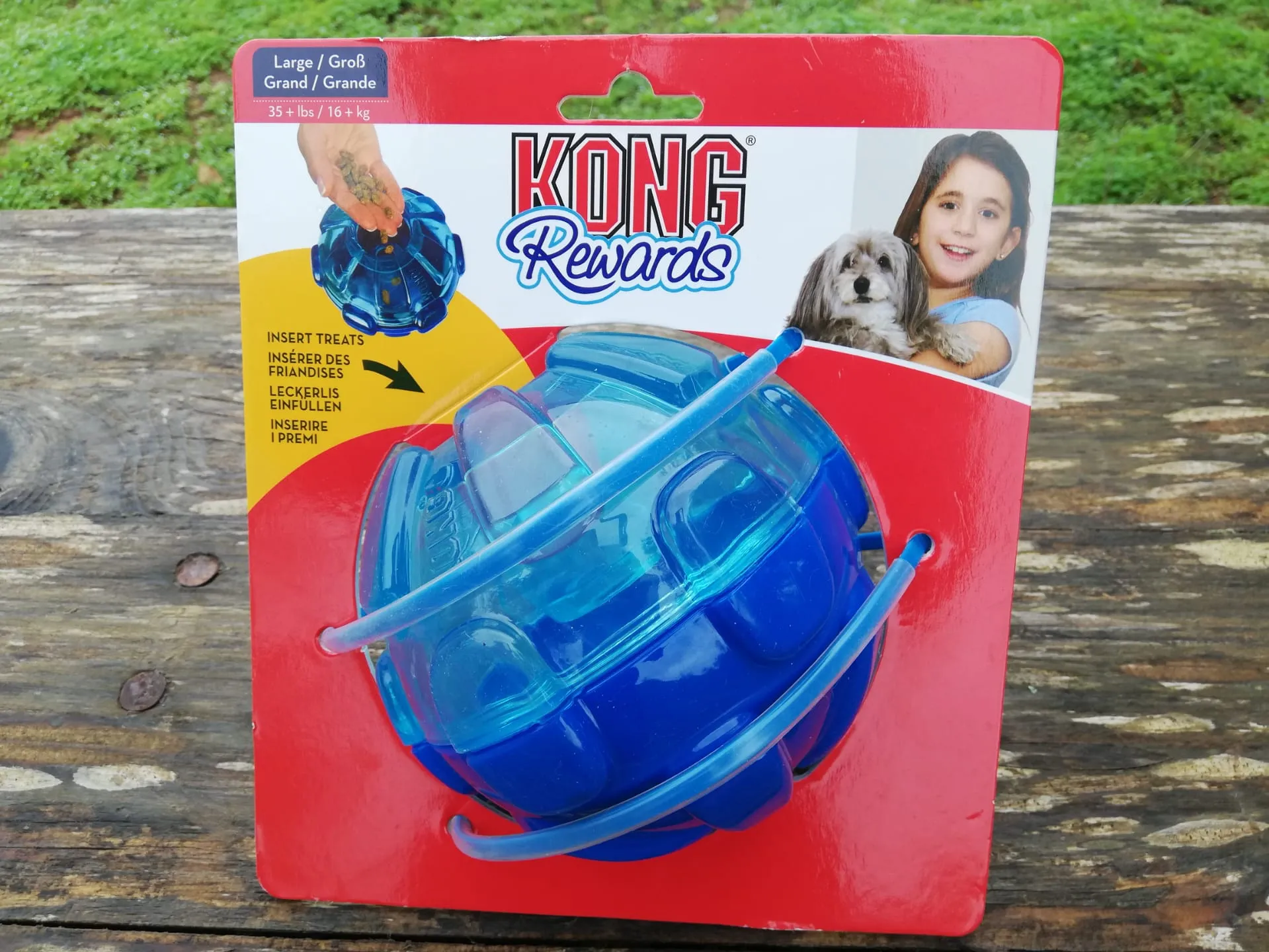
While initially met with curiosity, the KONG Rewards Ball quickly became a favorite. This toy cleverly combines play with a treat dispenser, keeping dogs amused for extended periods. It’s easy for humans to fill with treats, and the dogs don’t have to exert excessive effort to get their reward. The dogs particularly enjoyed the soft, bouncy rubber side of the toy.
Jean absolutely loved this toy, spending hours chewing its rubbery surface before burying it and rediscovering it later. Komo, his usual playmate, didn’t get much of a chance to play! Despite the treat dispenser aspect, the dogs were more captivated by the toy itself.
This toy is a great example of best dog toys for lab puppies that can provide mental stimulation and physical activity. It withstands a lot of chewing and bouncing, and the treat dispenser is effective.
Details:
- Measurements: 12.7 x 12.7 x 12.07 cm
- Weight: 417 Grams
- Designed for: Dogs of 16 kg and above
Summary: This KONG toy is an all-around winner, combining two of a dog’s favorite activities: play and food. It’s a durable, tough toy that withstands vigorous play and serves as a simple, effective treat dispenser.
3. KONG Wobbler Interactive Treat Dispensing Dog Toy
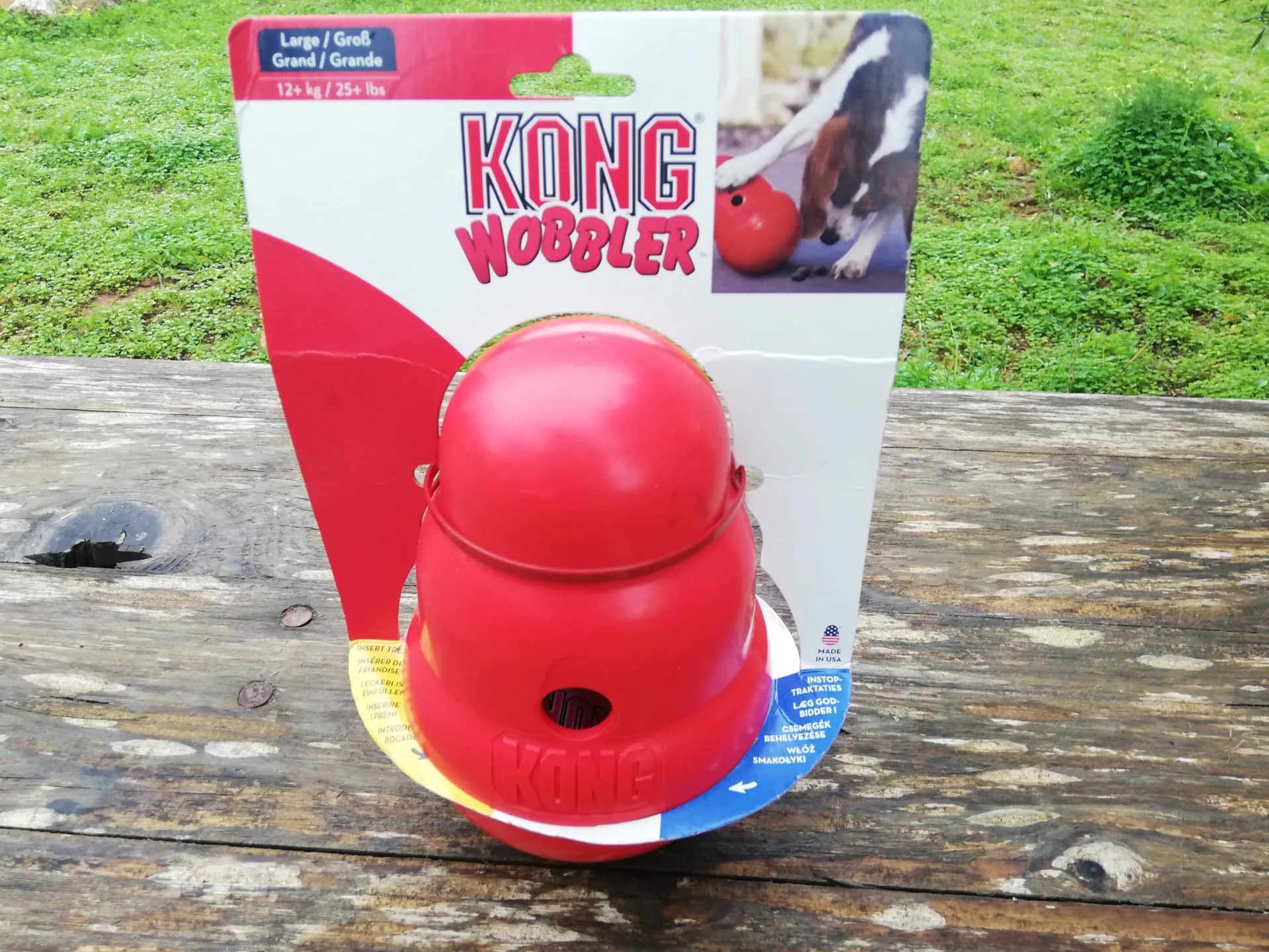
The KONG Wobbler elicited hilarious reactions from our canine testers. Its large size and unique shape made it a captivating object for them. Unlike many other KONG treat toys made of rubber, this one is constructed from a harder plastic polymer. For humans, the twist-off lid makes filling it with treats straightforward. Initially, the dogs struggled to figure out how to get the treats out, especially on the rougher surfaces of their kennels.
However, once we discovered it performs best on smooth surfaces and with appropriately sized treats, the dogs thoroughly enjoyed it. The large size makes it difficult for them to pick up in their mouths, which is a good thing as it reduces the chance of them getting their teeth stuck and potentially damaging the toy. Our dogs concluded this toy is indeed indestructible and easy to use, once the humans understood its nuances regarding treat size and surface type.
This toy is an excellent choice for owners looking for tough dog toys for destructive chewers who also enjoy interactive play.
Details:
- Material: Plastic polymer
- Measurements: Diameter 13 x 19 cm
- Weight: 485 grams
- Designed for: Dogs of 12 kg plus
- Maximum Filling Capacity: 250 grams
Summary: Once the dogs understood how the KONG Wobbler worked and we realized its optimal usage conditions, it became a massive hit. Its size presents a challenge, which is ideal for preventing destructive chewing.
Toys That Didn’t Quite Make the Cut (But Were Still Fun!)
While the above toys earned top marks, some others, though popular, didn’t quite meet the “indestructible” standard for our most powerful chewers. They still offered enjoyment for a period, but their longevity was questionable.
CyunCmay Indestructible Dog Toy XL Bone
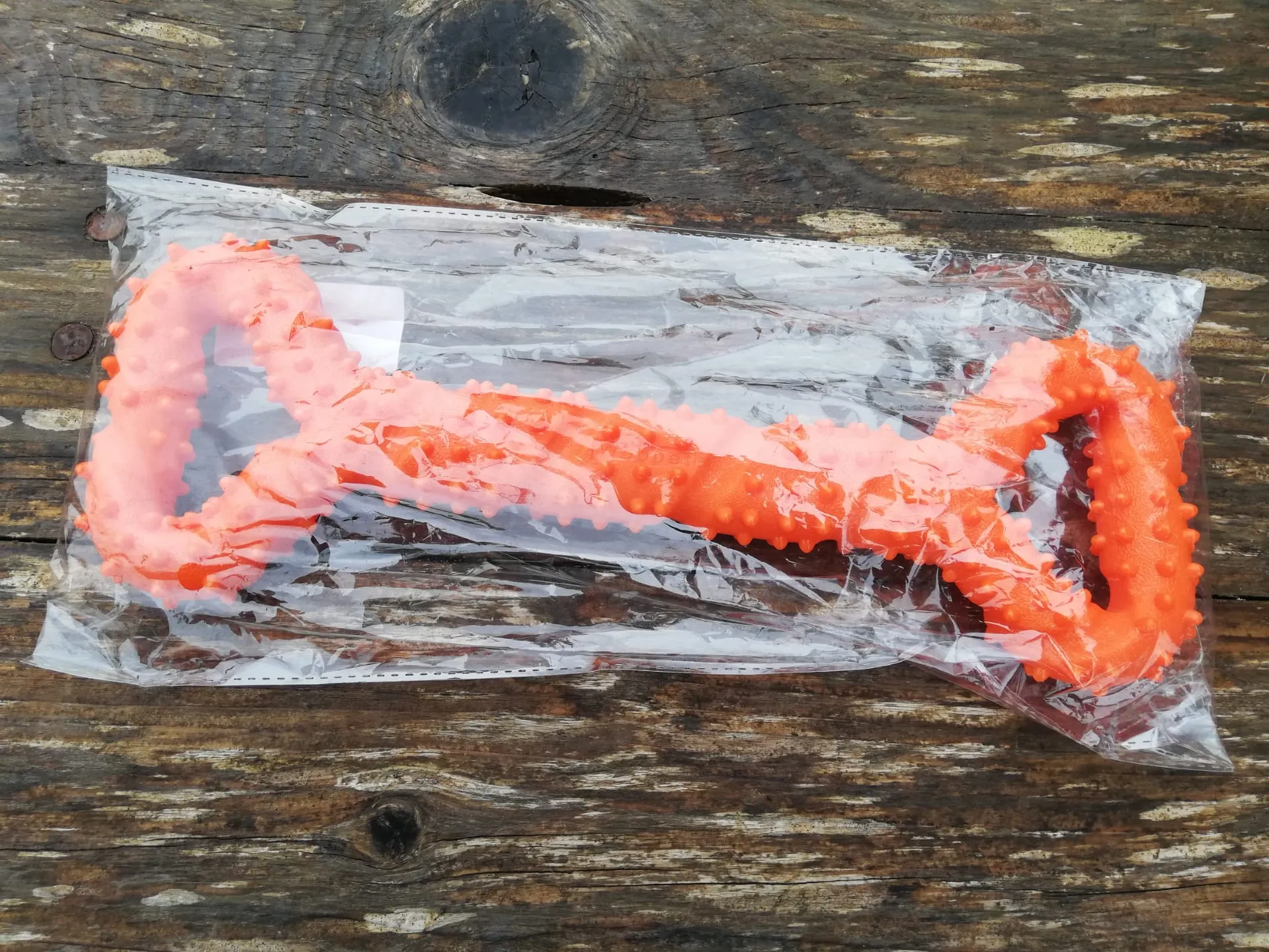
This toy initially generated immense excitement among the dogs. Black Nero, however, put it to the test immediately. Despite its soft, rubbery, and pliable material, which seemed promising, it unfortunately couldn’t withstand the rigorous testing from our dogs. Within 30 minutes, it showed significant teeth marks and was nearly split in two.
While described as strong and durable, the reality for our testers was different. It was fun for a short while, particularly for games of fetch and tug-of-war due to its handles. However, if you’re seeking a toy that will last for extended chewing sessions, this might not be the best option.
HETOO Indestructible Squeaky Dental Care Dog Toy
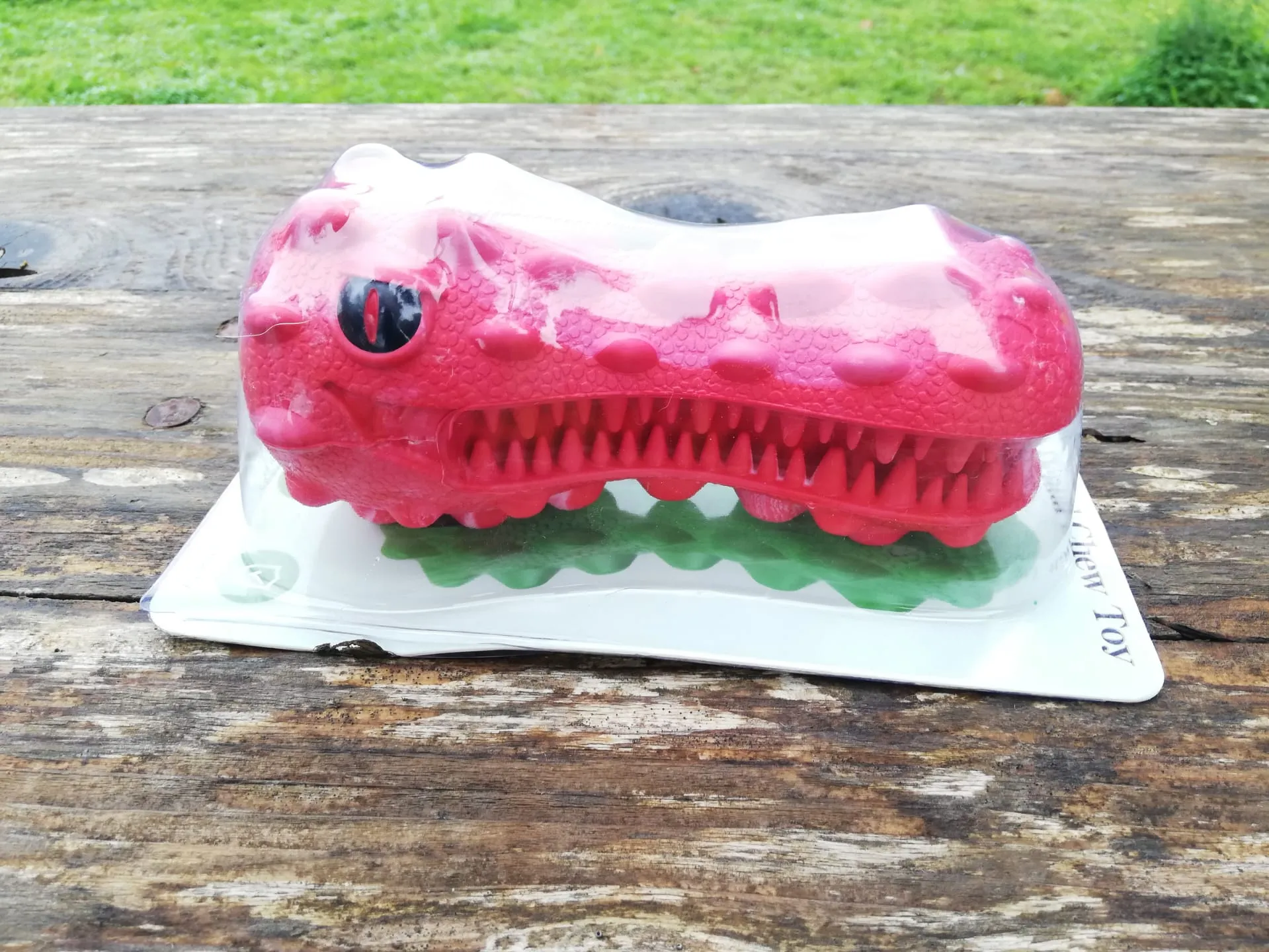
This toy was met with rather unenthusiastic reactions from our dog testers. Even the squeak failed to generate much excitement. Maya, our bravest reviewer, did show some initial interest but soon wandered off. To make it more engaging, we added peanut butter to the grooves, which briefly held Maya’s attention.
The HETOO toy did not excite our dogs or keep them entertained for long. Black Nero and Maya were the only ones to show any significant interest, and even that was very short-lived. While it’s designed for dental cleaning, it didn’t prove to be a long-lasting or highly engaging plaything for our pack.
Conclusion: Finding the Right Chew for Your Big Puppy
Choosing the best chew toys for big puppies is an investment in their well-being and your peace of mind. While no toy is truly “indestructible” for every dog, toys like the Nylabone Extreme Tough Dog Chew Toy and the KONG Wobbler come very close, offering exceptional durability and engagement for powerful chewers. The KONG Rewards Ball adds an extra layer of mental stimulation with its treat-dispensing feature.
Remember to always supervise your puppy during playtime with new toys and inspect them regularly for signs of wear and tear. When a toy becomes damaged, it’s time to replace it to ensure your puppy’s safety. By selecting durable, appropriately sized, and engaging toys, you can support your big puppy’s healthy development, satisfy their natural chewing instincts, and keep them happily occupied.
For more insights on keeping your canine companion happy and healthy, explore our other articles on tough dog toys for destructive chewers and durable chew toys for large dogs.
